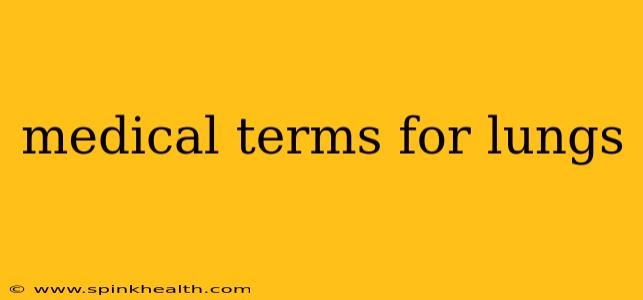Decoding the Lungs: A Journey Through Medical Terminology
The lungs, those vital organs of respiration, are a complex system with a rich vocabulary in the medical world. Understanding this terminology is key, whether you're a medical professional, a student, or simply someone curious about the intricacies of the human body. Let's embark on a journey through the fascinating world of medical terms related to the lungs.
Our story begins not with the lungs themselves, but with the very act of breathing, a process intricately linked to the air we inhale and exhale. The process of breathing in is inspiration, and the act of breathing out is expiration. These fundamental terms underpin many other medical concepts.
What are the different parts of the lungs and their medical terms?
The lungs themselves are made up of several key components, each with its own precise designation. The trachea, or windpipe, is the main airway that carries air to and from the lungs. Branching off from the trachea are the bronchi, larger airways that further subdivide into smaller and smaller bronchioles. These bronchioles ultimately lead to tiny air sacs called alveoli, where the crucial exchange of oxygen and carbon dioxide takes place – the very essence of respiration. The entire lung is enclosed within a protective membrane called the pleura, comprised of the visceral pleura (inner layer covering the lung) and the parietal pleura (outer layer lining the chest cavity). The space between these two pleural layers is the pleural space, normally containing only a small amount of lubricating fluid.
What are some common lung diseases and their medical terms?
Many diseases can affect the lungs, each with specific medical terminology. Pneumonia is an infection that inflames the air sacs in one or both lungs. Bronchitis is an inflammation of the bronchi, often caused by viral or bacterial infections. Asthma is a chronic condition that causes inflammation and narrowing of the airways, leading to wheezing, coughing, and shortness of breath. Emphysema, a type of chronic obstructive pulmonary disease (COPD), involves damage to the air sacs in the lungs, leading to reduced lung capacity. Pulmonary fibrosis is a condition characterized by scarring and thickening of the lung tissue, hindering the lungs’ ability to function properly. Lung cancer, encompassing various types like adenocarcinoma, squamous cell carcinoma, and small cell carcinoma, represents a serious threat to lung health.
How are lung conditions diagnosed?
Diagnosing lung conditions often involves several tests. A chest X-ray provides a visual image of the lungs, identifying abnormalities like pneumonia or tumors. Computed tomography (CT) scans offer more detailed images, allowing for better visualization of lung structures and lesions. Pulmonary function tests (PFTs) measure lung capacity and airflow, aiding in the diagnosis of conditions like asthma and COPD. Bronchoscopy, a procedure involving the insertion of a thin, flexible tube with a camera into the airways, allows for direct visualization of the bronchi and sampling of tissue for further analysis. Arterial blood gas (ABG) analysis measures the levels of oxygen and carbon dioxide in the blood, providing insights into the efficiency of gas exchange in the lungs.
What are some medical terms related to lung procedures?
Many procedures are used to treat lung conditions. Thoracentesis involves inserting a needle into the pleural space to remove excess fluid. Lung biopsy is the process of removing a small piece of lung tissue for microscopic examination. Lobectomy is the surgical removal of a lobe of the lung, while a pneumonectomy involves the removal of an entire lung.
This exploration offers a glimpse into the complex world of lung-related medical terminology. Understanding these terms is crucial for effective communication in the medical field and empowers individuals to better understand their own health and the conditions that can affect this vital organ system. Always remember to consult with a healthcare professional for any concerns related to your lung health. They can provide accurate diagnoses and personalized treatment plans.

